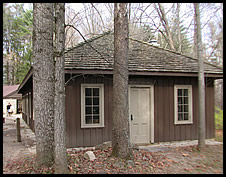Early History
McCormick's Creek has a rich history. Its earliest history is reflected in its geology: fossilized corals tell of Indiana's time as a shallow, tropical ocean; bits of granite brought to the area from Canada share its glacial story; flint artifacts tell part of the Native American history. McCormick's Creek and southern Indiana were shared hunting grounds for the Delaware, Miami and Shawnee before their forced removal.
In
1816, the area's first settler, John
McCormick, homesteaded nearly one hundred acres along the canyon
by the waterfalls. In those days it was common practice to name
physical landmarks after the people who owned them, and thus
the area became McCormick's Creek.
Commerce at McCormick's Creek
Early residents in the area cut timber, grazed their livestock
on the steep slopes and farmed small patches of flat upland
ground. They also tried building sawmills on the creek, although
the water level and force was never great enough to make the
ventures profitable. Other enterprising businessmen opened limestone
quarries near the mouth of the creek, but soon ran into problems
trying to get the cut rock across the river to the railroad
line on the other side.
The turning point in the McCormick's Creek history came in
1888 when part of the area was purchased by Frederick Denkewalter,
a physician who was interested in the scenic and restful qualities
of the site. Dr. Denkewalter felt the tranquil peace of the
canyon and its surrounding cliffs would be the perfect location
to build a sanitarium, a place for the wealthy and the weary
to "get away from it all" and recuperate.
The original sanitarium,
built on the present-day Canyon Inn site, was a white-sided
structure with long porches on every side. It offered guests
plenty of access to the loveliness of the well-landscaped grounds
where Denkewalter delighted in planting a variety of trees and
shrubs. Meanwhile, local residents continued to picnic and hike
along the canyon, making the spot a favorite of everyone for
rest and relaxation.
Birth of McCormick's Creek State Park
With the death of Dr. Denkewalter in 1914, his estate went
up for sale at a land auction. Both Owen County and the State
of Indiana were interested in maintaining McCormick's Creek
in its park-like setting, and so the land was purchased. McCormick's
Creek State Park was dedicated as Indiana's first state park
on July 4, 1916, as part of the state's centennial celebration.
Canyon Inn opened its doors in the old sanitarium building.
A few years later, in the early 1920s, the building was remodeled
and new brick siding was added. Subsequent changes have brought
new wings, a banquet room, swimming pool and recreation center,
but the Inn today still rests on the original foundations of
the Denkewalter sanitarium.
Originally a little over 350 acres in size, McCormick's
Creek State Park has grown to its present size through
acquisition of surrounding farms and homesteads as they come
up for sale.
Major Park Improvements
 Much
of the park's building improvements came in the 1930s when CCC
(Civilian Conservation Corps) Company 589 was in the park. Between
November 1933 and July 1935 the CCC men completed amazing amounts
of construction, including most of the shelter houses, the old
stone bridge, and the firetower. Three of their structures have
been honored by being placed on the National Register of Historic
Places. These include the CCC
Recreation Hall, the stone arch bridge over Echo Canyon
and the park gatehouse. Much
of the park's building improvements came in the 1930s when CCC
(Civilian Conservation Corps) Company 589 was in the park. Between
November 1933 and July 1935 the CCC men completed amazing amounts
of construction, including most of the shelter houses, the old
stone bridge, and the firetower. Three of their structures have
been honored by being placed on the National Register of Historic
Places. These include the CCC
Recreation Hall, the stone arch bridge over Echo Canyon
and the park gatehouse.
Another surge of development came in the early 1970s when the
present campgrounds, nature center and swimming pool were added.
Today the park is a delightful combination of history set in
modern surroundings.
Want to know even more about the history, geology, plants or
animals of McCormick's Creek State Park?
Check out the Nature Center
for exhibits, brochures, interpretive services and more.
|

